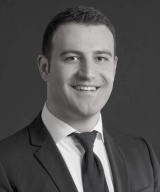Pharmacist Luis Ilia

Institute of Pharmacy
Clinical Pharmacy & Biochemistry
Freie Universität Berlin
12169 Berlin
Curriculum Vitae
|
Since 10/2017 |
Doctoral student at the Dept. of Clinical Pharmacy & Biochemistry supervised by Prof. Dr. Charlotte Kloft at the Freie Universitaet Berlin |
|
01/2017 – 06/2017 |
Research scholar in the working group of Prof. Dr. Hartmut Derendorf, University of Florida, Gainesville / USA, College of Pharmacy, Dept. of Pharmaceutics |
|
03/2014 – 10/2017 |
Pharmacist at Apotheke im Hauptbahnhof, Frankfurt am Main |
|
12/2015 – 10/2017 |
Pharmacist at Westendapotheke, Frankfurt am Main |
|
02/2014 |
Licensed pharmacist |
|
05/2013 – 10/2013 |
Pre-registration Pharmacist at Merck KGaA, Dept. Research & Development, Darmstadt |
|
11/2012 – 04/2013 |
Pre-registration Pharmacist at Apotheke am Theater, Gießen |
|
08/2011 – 10/2011 |
Research scholar at Merck-Serono, Geneva, Switzerland |
|
04/2008 – 10/2012 |
Studys of Pharmacy at Johannes-Gutenberg-Universität, Mainz |
|
08/2007 – 04/2008 |
Civilian Service at the Universitätsklinikum, Gießen / Marburg |
|
07/2007 |
A Level at Liebigschule, Gießen |
The focus of my research work is to determine target site pharmacokinetics of antiinfectives using a combined microdialysis as well as modelling & simulation approach for dosing and treatment optimisation.
Research pillar 1: Bioanalysis/microdialysis and in vitro systems/cell culture
Developing and finding the optimal dose and therapy of antiinfectives with the goal of optimising therapeutic outcome, minimising adverse drug reactions and preventing the emergence and spread of resist is a main challenge in our healthcare system.
Administration of a defined amount of drug to patients results in different effects, which is founded in different pharmacokinetic profiles depending on individual physiological conditions as well as different properties of the pathogen, such as susceptibility or resistance to the respective antiinfective.
In order to effectively eradicate a microorganism, an antiinfective should remain sufficiently high concentrations at the target site for a sufficient period of time. Achieving and maintaining optimal target concentrations of antiinfectives is also crucial to avoid emergence of resistance. Microdialysis has been used in clinical studies to study unbound drug concentrations in a large variety of human tissue types. This minimally invasive and direct technique is based on passive diffusion of molecules across a semipermeable membrane at the tip of a microdialysis catheter. The catheter is continuously perfused with a solution (perfusate) that closely resembles the composition of the surrounding tissue fluid at a low flow rate. Unbound drug in the extracellular tissue fluid can be determined by measuring the drug concentration in the collected dialysate. Catheter calibration needs to be performed to account for relative recovery values less than 100%.
To determine the unbound drug tissue concentrations appropriate bioanalytical assays have to be developed and validated according to the EMA requirements.
Research pillar 2: Pharmacometric data analysis
A microdialysis feasibility study of an antibiotic in neonates and infants was successfully performed in cooperation with the University hospital in Munich.
After specifying the unbound drug concentrations over time at the target site, clinical data will be further investigated by performing a pharmacokinetic analysis to obtain knowledge about the pharmacokinetics and pharmacodynamics of antibiotics in neonates and infants.
Based on simulations using developed models, fundamental predictions shall be done for future clinical trials and clinical therapies, respectively, to obtain optimised treatment recommendations.